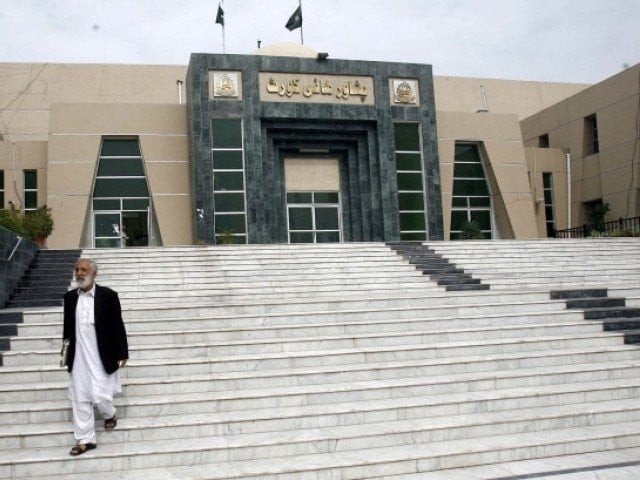Locked : Judgment reserved in Ehtesab case
Provinces could make laws in areas left vacant by the Parliament

Peshawar High Court. PHOTO: PPI
A larger bench of the Peshawar High Court (PHC) on Monday reserved its judgment in constitutional petitions challenging the Khyber-Pakhtunkhwa EC Act (KPECA) 2015 and the Ehtesab Commission.
Additional Attorney General Atiq Shah appeared before the bench headed by Chief Justice Mazhar Alam Miankhel and argued the National Accountability Ordinance would prevail as it was promulgated 16 years ago in 1999. He contended the Supreme Court of Pakistan endorsed NAO in the Asfandyar Wali case, adding the ordinance did not affect provincial autonomy.
The AAG said after the 18th Constitutional Amendment, provinces were empowered to legislate on criminal law, the criminal procedure and evidence. “Provinces could make laws in areas left vacant by the Parliament. However, if the federal and provincial governments legislated over the same fields, a conflict may arise,” he argued.
Shah said the previously promulgated law would prevail if such a situation arose. The counsel said the NAO must prevail in this case as it was introduced in 1999.

He said the law was protected under Article 270AA and would continue to prevail unless a competent authority made amendments or repealed it. The lawyer added Parliament was the competent authority in this case.
Case in point
NAB Deputy Prosecutor General Jamil Saraf told the bench the law was effective and applied to the entire country. Shah contended the provincial government should move the SCP if it had any problems with the legislation.
Sardar Ali Raza, representing one of the 15 petitioners who had filed against the Ehtesab Commission, argued the federal government had the authority to constitute courts.
“Barrister SM Zafar, in a letter to the federal government, advised not to abolish the concurrent list completely as it may lead to differences between the federal and provincial governments in legislation,” he informed the bench.
Defending the right to voluntary return money in embezzlement and corruption cases, Raza argued the NAB law facilitated suspects to return looted money voluntarily, but this was not allowed by the KPECA.
Raza said NAO applied to the entire country and could not be restricted to a particular part.
Moazzam Butt, representing another petitioner, argued KPECA was passed in haste and this could be proved by a look at the K-P Assembly’s records.
“Every law with the stamp of the provincial assembly on it cannot be justified,” he argued.
Justice Nisar Hussain asked why the opposition did not oppose the bill in the provincial legislature if there were reservations.
Butt replied the opposition was not given enough time. However, Advocate General Abdul Latif Yousafzai said all legal requirements had been fulfilled before approving the bill. The bench, after hearing arguments from both sides, reserved its judgment.
Published in The Express Tribune, December 1st, 2015.













COMMENTS
Comments are moderated and generally will be posted if they are on-topic and not abusive.
For more information, please see our Comments FAQ